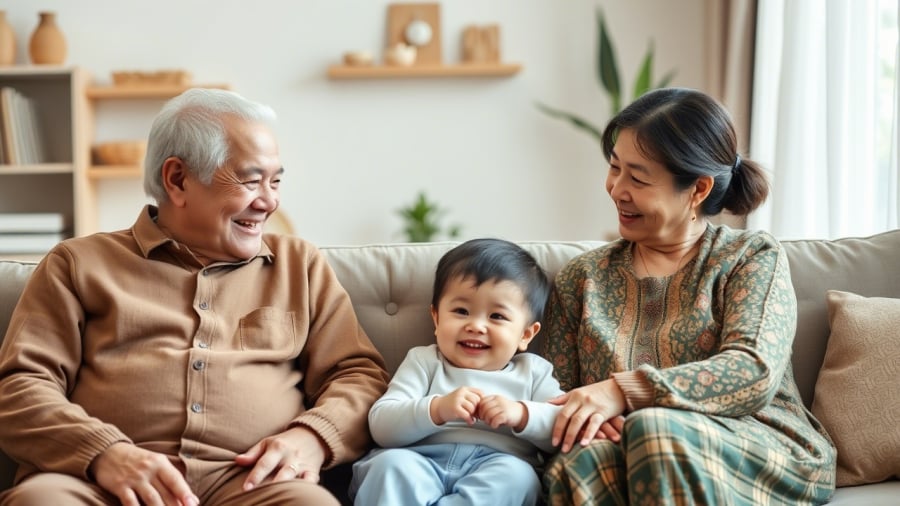Choosing a life partner is deeply influenced by family values, in addition to love. This raises the question: Among the three closest generations – father, mother, and grandmother – who has the greatest influence on this important decision? In this article, we will explore the role of each and how they shape their descendants’ future relationships.
Parental Influence: Laying the Foundation for Relationships
Parents are often regarded as a child’s first teachers. Renowned psychologist Carl Jung asserts, “The way parents treat each other is the first model of marriage that children learn from.” This implies that their behaviors, words, and attitudes reflect not only their marital relationship but also leave an impression on how their children perceive love and marriage.
A study published in VnExpress in 2022 quoted psychologist Nguyen Thi Minh Huong, who stated: “If parents have a healthy, respectful, and loving relationship, their children will tend to believe in love and easily seek a similar relationship.” Conversely, if parents frequently conflict or impose too much, children may develop a fear of marriage or choose unhealthy relationships to fill emotional voids.
For instance, a girl growing up in a family where the mother always sacrifices for the family may unconsciously believe that women need to endure for the sake of happiness. Or a boy witnessing his father controlling his mother’s every decision may replicate this dynamic in his relationships.

Grandmother’s Influence: Inspiring from the Previous Generation
Aside from parents, grandmothers also play a significant role in shaping their grandchildren’s personalities and values. Grandmothers are often storytellers, sharing life experiences and transmitting family cultural values across generations. The bond between grandmother and grandchild is usually more relaxed and intimate, allowing grandchildren to absorb lessons naturally.
According to psychologist Le Thi Linh Trang, quoted in Dan Tri newspaper, “A grandmother is not just a caregiver but also a role model for compassion, patience, and resilience.” Their stories about life and how they navigated marital challenges can sometimes become a great source of encouragement for grandchildren facing similar issues.
However, a grandmother’s influence can have both positive and negative aspects. If she frequently complains about marriage or expresses outdated views, it may create biases in her grandchildren’s minds about choosing a life partner.

Comparison and Analysis: Who Has the Greatest Influence?
When comparing parents and grandmothers, it’s evident that both have distinct contributions, differing in degree and scope of influence. Parents, due to their direct and daily interaction, tend to have more concrete impacts on their children’s behaviors and thoughts. In contrast, grandmothers, as storytellers, often shape core values and long-term beliefs.
Educator Sukhomlinsky once said, “The mother is the emotional, moral, and aesthetic nucleus of the family.” However, it’s undeniable that grandmothers also play a part in maintaining and transmitting these values across generations. Thus, the degree of influence of each depends on specific circumstances, such as the closeness of the grandchild-grandmother relationship or the parenting style of the parents.
Practical Advice for Readers
- Know Yourself: Before entering a relationship, take time to recognize family influences. Are you repeating any patterns from your parents or grandmother? This awareness allows you to make conscious changes if needed.
- Build Healthy Relationships: Prioritize respect, understanding, and open communication with your partner. Don’t let past biases control your happiness.
- Accept Failure: Marital life is not without mistakes. Remember that failure doesn’t mean the end; it’s an opportunity to learn and improve.
- Give Love and Freedom: Whether as a parent or grandmother, the most precious gift you can give your descendants is love and the freedom to explore the world in their unique way.
Choosing a life partner is a personal decision, but family influence is undeniable. Parents and grandmothers each contribute to shaping how descendants perceive love and marriage. It’s essential to recognize these influences and balance family values with individual needs. As philosopher Erich Fromm said, “Love is not only a feeling but also an art.” Let’s turn marriage into a masterpiece of love, freedom, and understanding.
“The Ultimate Guide to Winning Your Ex Back: Strategies for Reconnection and Romance.”
As I walked into my ex-husband’s wedding, a surge of emotions washed over me. Was it curiosity or a need to validate my own path that led me here? Perhaps it was a mix of both. I wanted to witness this new chapter in his life, to see if he had indeed found happiness and to quietly reassure myself that I, too, had moved on.
A Mother’s Influence: Nurturing Virtues for a Child’s Destiny
As a parent, you play a pivotal role in shaping your child’s future. Your actions and behaviors serve as a roadmap for your child’s journey towards success. Instill values of hard work, dedication, and a growth mindset by being a role model yourself. Lead by example and watch your child flourish, mirroring your exemplary conduct.














